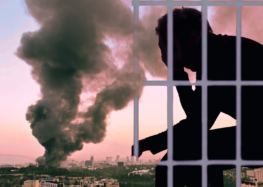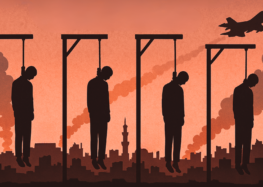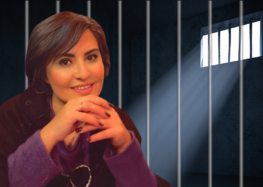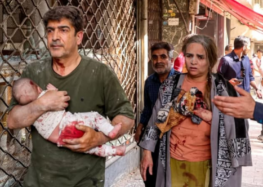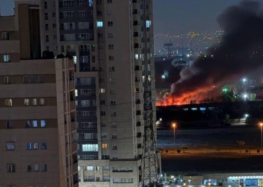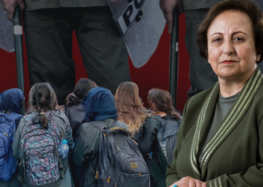Iran Launches Sweeping Crackdown: Hundreds Detained, Executions Underway
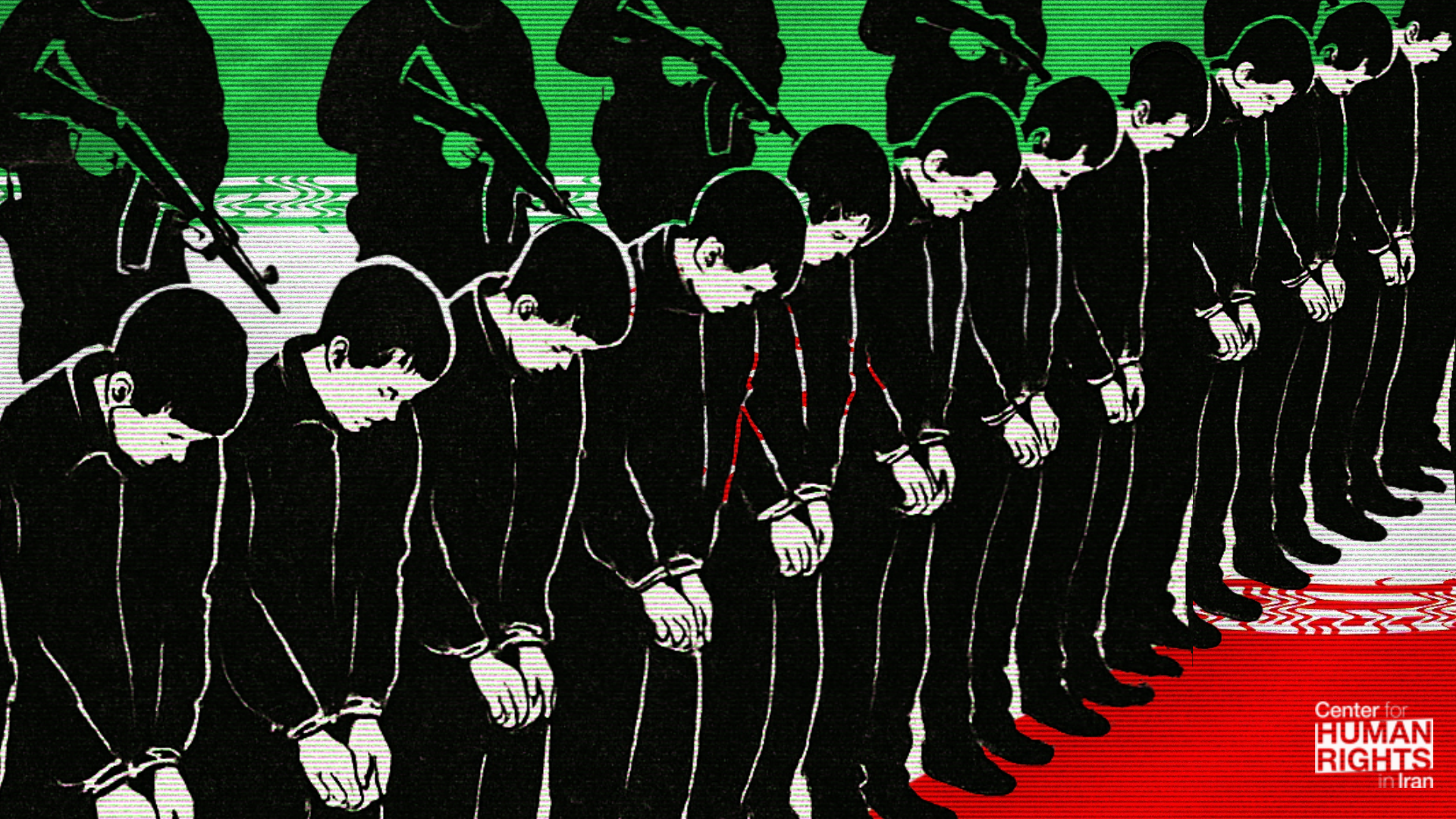
U.S. Must Confront Iran Over Human Rights Abuses in Upcoming Talks
June 26, 2025—Hundreds of ordinary citizens, members of religious and ethnic minorities, activists, and others are being rounded up and arrested in Iran as the Islamic Republic, facing its most serious challenge to date, moves to stamp out any trace of dissent and reassert its control.
Key Developments:
- Over 700 individuals have been arrested across Iran in the past 12 days, with many hundreds more detained in Tehran. Checkpoints are set up in many cities to aid in arrests.
- Six executions on espionage charges have been carried out just since the war began, with additional death sentences expected.
- Detainees are being subjected to fast-tracked trials in kangaroo courts without lawyers or due process.
The Center for Human Rights in Iran (CHRI) calls on the Trump administration to forcefully raise these grave human rights violations in the upcoming negotiations with Iran and warn the Iranian authorities to immediately cease the domestic crackdown on its people.
“Like a wounded animal, the Islamic Republic is going after every perceived threat in the country with deadly force,” said Hadi Ghaemi, CHRI executive director.
“And true to form, the Iranian authorities are locking people up incommunicado without cause or access to a lawyer, and sending them to the gallows on ‘national security’ charges in order to terrorize the public and reestablish control,” Ghaemi said.
In just 12 days of war between Iran and Israel, at least 700 people in cities across Iran have been arrested for alleged collaboration with Israel, according to Iran’s Fars News Agency (126 in Kermanshah, 76 in Isfahan, 62 in Khuzestan, 53 in Fars, and 49 in Lorestan)—while CHRI has received credible reports of additional hundreds—if not more than a thousand—being rounded up and arrested inside Tehran, the capital.
Executions have already begun. Since the war’s outbreak, six individuals have been hanged on espionage charges—three in just the past few days. Two others were executed on the same charges shortly before the conflict began. More are expected to swiftly follow.
CHRI calls on the U.S. and leaders worldwide to demand that the Iranian authorities immediately:
- End the arbitrary arrests and illegal detentions
- Halt all executions
- Uphold due process rights and legal representation for all detainees
- Ensure unrestricted internet access
Interviews CHRI conducted on June 25, 2025, with lawyers, activists, and other citizens inside Iran depict the tense, highly securitized atmosphere in the country right now:
Lawyer in Iran: “Checkpoints Have Led to Many Arrests”
A human rights lawyer based in Iran spoke to CHRI on June 25, 2025, about the mass arrests and checkpoints that have been set up to facilitate them:
“The main issue has been the extreme difficulty in communication and accessing information. …But these checkpoints have led to many arrests, as I personally have witnessed them. Many of those detained at the checkpoints were not involved in political or security activities. Some were simply filming out of curiosity and were arrested for that alone.”
This Tehran-based lawyer also commented on the Israeli strike on Evin Prison and the destruction of its administrative buildings, telling CHRI:
“Right now, the doors to the Evin Courthouse have been shut, and no one is providing any answers. This has created major problems. You have to understand that this building inside Evin is where lawyers and families go to follow up on prisoners’ cases. With things the way they are, even the minimal ability for lawyers to advocate for detainees has been taken away.”
Kurdish Protester: “People Are Now in Hiding”
An activist in one of Iran’s Kurdish cities described the intensifying security atmosphere in Kurdish-majority areas:
“In many Kurdish cities—especially the smaller ones—the situation is very tense. A lot of citizens have a history of political or civic activism, or they participated in the [Woman, Life, Freedom] protests. Since the war started, pressure and threats against civil and political activists—and even people who were only previously arrested during protests—have drastically increased. I know several people in my own town who are now living in hiding.”
IRGC Checkpoints Set Up at Entrances and Exits of Many Kurdish Cities
The Kurdish activist added:
“Basij and IRGC [Islamic Revolutionary Guard Corps] forces have set up checkpoints at the entrances and exits of many Kurdish cities in Kurdistan and West Azerbaijan provinces. They were searching civilian vehicles and arresting individuals. I know of one family whose two sons were arrested at a checkpoint three days after the war began, and they still have no information about their fate.”
IRGC: “We will show no mercy. Anything could happen to you.”
Another informed source from a different Kurdish city told CHRI about the escalating security and police presence in Iran:
“The IRGC intelligence unit and the Ministry of Intelligence have summoned and interrogated relatives of Kurdish political activists who live abroad. These agencies have pressured and threatened the families to force their relatives overseas to stop their activism. For example, during one interrogation, the family of a Europe-based human rights activist was told: ‘If there is the slightest sign of activity against the Islamic Republic, we will show no mercy. Anything could happen to you.’”
Groups Known To Be Targeted So Far
Social media users: HRANA has reported that since the outbreak of hostilities, Iranian security forces have arrested at least 286 citizens for expressing opinions related to recent events and charged them with online propaganda against the regime.
Activists: Numerous civil, political, and cultural activists have been arrested. The following are just a few of the known cases. According to reports, all of these arrests were made without judicial warrants and involved violence.
- Mostafa Mehrain, sociologist, arrested June 15.
- Motahareh Gune’i, student activist, arrested June 14.
- Sajjad Mashhadi Hemmatabadi, political activist in Mashhad, arrested June 16; location unknown.
- Danial Moghaddam, rapper in Tehran, arrested June 25.
- Mohammadreza Ehsani Sard, rap singer from Najafabad, detained June 24; location unknown.
- Hossein Mirbahari, prominent child-rights activist, arrested June 22 at home in an extrajudicial raid.
- Dr. Morteza Asadi, political science professor, Tehran, arrested June 21.
- Hossein Ronaghi, media activist, Tehran, arrested June 23.
- Reza Daryakanari, graphic designer/photographer, Tehran, arrested June 21.
- Sajjad Sadeghi, former radio presenter and researcher, Tehran, arrested June 25.
- Kourosh Hatami, former political prisoner from 2022 protests, arrested in Urmia June 22 by IRGC intelligence.
- Dr. Hassan Bagherinia, Mashhad professor expelled during the Woman Life Freedom protests, arrested June 19, along with his wife, Fatemeh Nouradi.
- Rahim Baghal Asghari, writer/cartoonist from Tabriz, arrested June 24.
- Hamid Pishghadam, activist in Shahriar Karaj, arrested June 24.
- Kianoush Cheraghi, former political prisoner, Dehloran, arrested June 22 in Ilam.
- Pouria Nasiri, law student in Mahabad, arrested June 20 without judicial warrant.
- Omar Mohammadi, poet and writer in Oshnaviyeh, arrested June 21; transferred to Urmia detention.
- Saidoun Ghazali, 60-year-old activist in Mahabad, arrested June 22.
- Khaled Bakri and Mohammad Bakri, former political prisoners in Mahabad, arrested June 22.
- Rahman Hosseini (Dalavaran) and Ahmad Mam-Sharifi, activists in Piranshahr, arrested June 22.
- Ismail Ismailpur, civil activist in Bukan, arrested June 22.
- Arian Moshayekhi and Sadegh Mahmoudnejad, previously injured protesters, arrested in Piranshahr on June 22.
- Edris and Kamran Rasouli, political activists in Oshnaviyeh, arrested June 22.
- Hamid Dastvaneh, former political prisoner in Dehdasht, arrested June 21.
Minority communities, especially Kurds: Long a target of state persecution and violent suppression, minority communities have been disproportionately targeted in the current crackdown. Kurdish-majority Kermanshah has seen the highest number of arrests, as noted above (according to Iran’s Fars News Agency, 126 arrests in Kermanshah alone).
Baha’is: Since the war began, numerous Baha’i citizens have been targeted for arrest all over the country. HRANA reports that at least 20 Baha’is have been arrested, summoned, or had their homes searched, including:
- Iman Rahmatpanah in Shiraz: arrested June 22, transferred to the Ministry of Intelligence detention center.
- Navid Tashakkor in Isfahan: arrested June 22; taken to undisclosed location.
- Arman Nikayin in Shiraz: arrested June 23; location unknown.
- Novyan Hejazi in Jouybar: arrested June 25; location unknown.
Justice-seeking families: Families seeking justice for family members previously injured or killed by state security forces have been targeted. Known cases (all these individuals were reportedly seized without judicial warrants and with excessive force) include:
- Ali Mohammadi, father of protest victim Shahriar Mohammadi, arrested June 18.
- Soleiman Qaderi Golvani, brother of victim Abdolsalam Qaderi Golvani, arrested June 22 in Oshnaviyeh.
- Feyzollah Azarnoush, father of 17-year-old protest victim Pedram Azarnoush, arrested June 20 in Dehdasht.
- Majid Naderkhani, father of victim Metin Naderkhani, arrested June 22 in Tehran.
Parliament Pushing Through Draconian New Espionage Law
On June 23, 2025, Asghar Jahangir, spokesperson for Iran’s Judiciary, stated that the current provisions in Iran’s Penal Code regarding espionage are inadequate for countering modern spy techniques, and that the parliament plans to provide the judiciary with broader authority to impose deterrent punishments on spies.
Saeid Dehghan, a prominent Iranian human rights lawyer and director of the Parsi Law Collective, spoke to CHRI about the implications of this draconian new bill:
“The regime’s attempt to pass new criminal laws with vague and overly broad provisions, laws that could impose the death penalty for legitimate civil activities or even for the use of social media, represents a dangerous example of using law as a tool to legitimize repression. This trend violates Iran’s human rights obligations and also poses a serious threat to regional security and the international legal order.”
According to details released by Tasnim News Agency, which is affiliated with the IRGC, this draft law aims to supplement the penal code and consists of five articles:
Article 1 states, “Any intelligence or espionage activity for the Zionist regime or hostile states, including the United States, that undermines national security or interests, shall be considered mofsad fi’l-arz (spreading corruption on Earth) and subject to punishment under Article 286 of the Penal Code.” This is the same legal framework under which most death sentences for political and ideological detainees have been issued.
Article 2 targets citizen journalists who share content from public spaces with media entities or others. It stipulates that any individual or group collaborating with the Zionist regime or hostile states—including the United States—or their agents, against national security or interests, if not punishable under mofsad fi’l-arz, shall be sentenced by the court to first-, second-, or third-degree discretionary imprisonment (ta’zir) and permanently barred from public and state service.
Article 3 addresses actions that constitute direct or indirect assistance, with intent or knowledge, to support, strengthen, consolidate, or legitimize Israel.
Together with Article 3, Article 4, which defines the offenses in detail, prescribes first- to third-degree discretionary imprisonment (ta’zir) and permanent dismissal from public service for:
- Collaboration in supplying, transferring, producing, buying, selling, or using any weapon—firearms, cold weapons, chemical, biological, nuclear, or unconventional—“in any form that leads to killing, destruction, or instilling terror.”
- Cooperation in any activity involving micro-drones (small UAVs), drones, or military, espionage, destructive, or disruptive robots targeting vital infrastructure.
- Involvement in cyber warfare, cyberattacks, disrupting communication or information networks, or any assistance to such actions organized or supported by Israel or hostile states.
- Cooperation in media or propaganda efforts—such as sharing content with foreign or opposition networks—that undermine public morale, create division, or threaten national security.
Article 5 states that the law becomes immediately effective upon ratification.
This general outline has been recently approved by parliament, paving the way for swift, draconian punishments, including execution, in a system for which there are absolutely no due process or fair trial safeguards.
Upcoming US-Iran talks: A Critical Opportunity to Warn Iran, Save Lives
The upcoming US-Iran talks present a critical opportunity to send a clear message to the Islamic Republic that these abuses will not be ignored.
The Center for Human Rights in Iran (CHRI) urges the U.S. to raise these abuses as a top priority during upcoming diplomatic engagements with Iran.
“Any dialogue with the Islamic Republic that ignores the human rights crisis underway in Iran right now risks legitimizing Tehran’s violent suppression of its own people,” said Ghaemi.
“The regime is using the pretext of war to carry out a systematic purge of dissent,” said Ghaemi. “If the international community remains silent, we will see mass state violence go unchecked.”
For further information or to request a briefing, please contact the Center for Human Rights in Iran at: [email protected]
This report was made possible by donations from readers like you. Help us continue our mission by making a tax-deductible donation.

